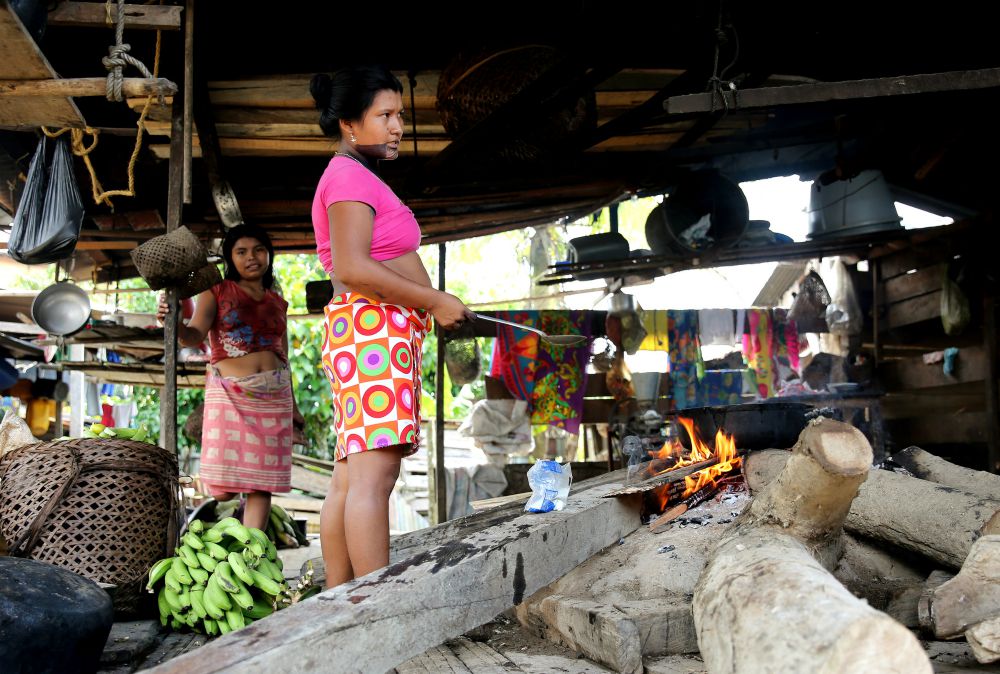
An indigenous Embera woman cooks food in Quibdo, Colombia, March 2017. (CNS/EPA/Leonardo Munoz)
Pope Francis recently convened oil and gas corporation executives and investors in an unprecedented conference, calling for a conversion to renewable energy to care for our common home.
Francis' address built on the long history of Catholic teaching on care for creation, and rang themes familiar to many of us from our parishes.
"We know that the challenges facing us are interconnected. If we are to eliminate poverty and hunger … the more than one billion people without electricity today need to gain access to it," he told the fossil fuel executives.
Energy access and climate issues are intrinsically linked. Over 1.1 billion people around the world have unreliable access or no access to electricity. An astounding three billion people worldwide rely on solid fuels such as firewood, charcoal, coal and dung for cooking.
Burning these types of fuels, especially indoors, is a major source of air pollution and is estimated to lead to 4.3 million premature deaths each year. Those millions of precious lives are not less valuable than our own. There are domino effects for girls and women, who often a spend lots of time collecting these fuels — time they cannot use for education or employment.
Energy poverty is one of the most important obstacles to social and economic development for the poor, next to lack of clean water and food. Our current energy system leaves a major portion of the world's population behind. These are the people who are living on mountaintops and islands, in rural areas, or in refugee camps.
And for many of them, the little energy they do have comes at a high cost. Many poor nations import fuels, and in some, the high costs now eat up more than 10 percent of the GDP. This puts the comforts we take for granted — such as refrigerators for our medicine or lights for our homes — out of reach for ordinary people.
We can solve this problem. Plummeting prices for innovative renewable energy technologies such as off-grid solar help. So does mobile payment technology, which enables many poor people in the Global South to make digital payments. The solutions exist. But our sisters and brothers need investment in these crucial technologies.
On July 8, at the invitation of Catholic Relief Services and the Dicastery for Promoting Integral Human Development, impact investing experts and Catholic leaders from around the world will convene in Rome. At the Vatican's impact investing conference, they will share and evaluate blended finance models and investible vehicles to address systemic challenges of great importance to both the Catholic Church and the global community.
Advertisement
This conference will follow on the heels of a gathering held July 5-6 to celebrate the third anniversary of Francis' encyclical on climate change and ecology, "Laudato Si', On Care for Our Common Home," which gave new encouragement to the church in its decades-long engagement on climate change. The pope shared the call familiar to so many of us: climate change affects all of us, especially the most vulnerable, and we serve our faith by stopping it.
Both of our organizations will attend the Third Vatican Conference on Impact Investing because we want to be present at the dawn of a new energy area for our sisters and brothers around the world. This event will be results-oriented, catalyzing collaboration among participants, mobilizing capital, and generating select commitments to action. The biennial series of Vatican impact investing conferences is a vital, long-term global platform around Francis' vision of "putting the economy at the services of peoples."
Together, we can do this. By investing $50 billion by 2030, we can end energy poverty and advance the clean energy economy. Including civil society organizations, faith partners and parishioners, we all have a role to play.
There are more than 1.2 billion of us in the Catholic Church. By working and investing together, we can provide clean energy for the 1.1 billion people who are depending on us. That's an investment that will grow what's truly valuable: neighborly love.
[Tomás Insua is the executive director and co-founder of the Global Catholic Climate Movement. Lisa Jordan is the campaign director of The Shine Campaign, a new, global campaign blending communities of faith, philanthropy and finance to solve energy poverty.]








